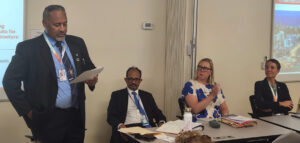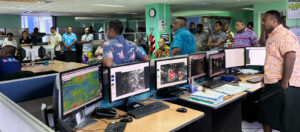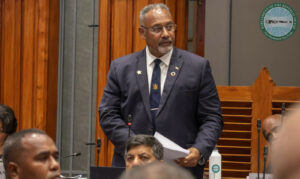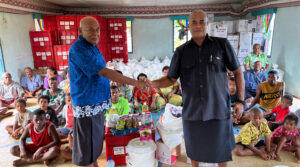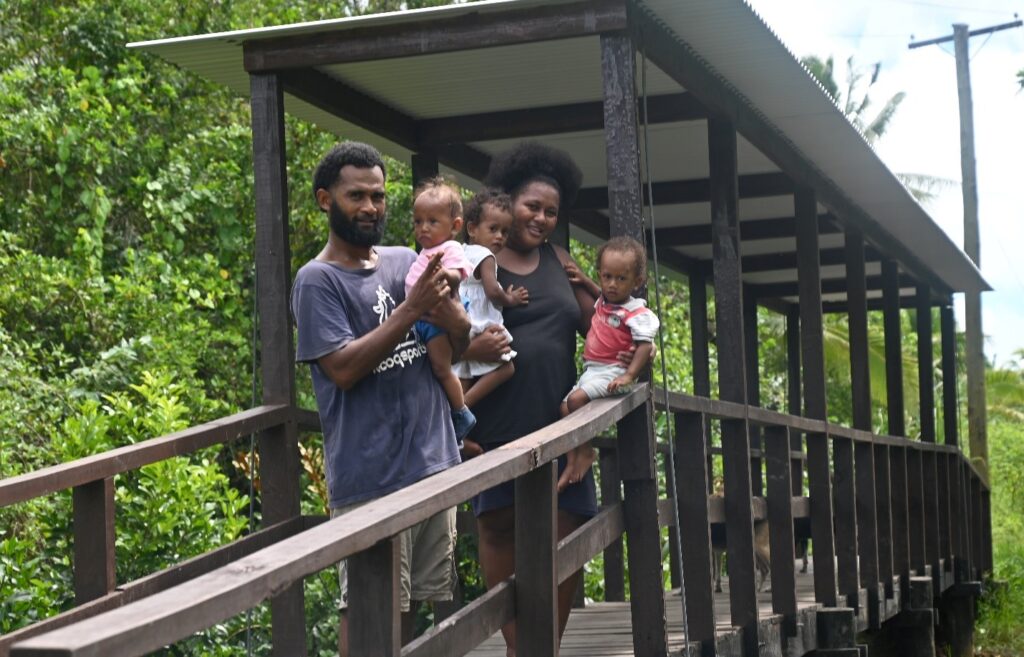
Caption: Navaka farmer Mr. Josaia Rawamila and his family at the newly constructed foot-crossing that has improved accessibility for them and many other who use the infrastructure to get to and from their homes and plantations daily.
SUVA – Decades of having to access their homes and plantations using a coconut trunk is now history for villagers of Navaka in Rewa.
This after the Government, through the Ministry of Rural and Maritime Development and Disaster Management and the United Nations Development Programme’s (UNDP) Governance for Resilient Development in the Pacific (Gov4Res) Project worked with the village to provide improved access to and from their homes with the construction of a foot-crossing.
Navaka farmer Mr. Josaia Rawamila says the new and improved foot-crossing has eased a lot of burdens for them.
“I was brought up here but was away for a few years for work. I returned to look after my late mother when she became ill. She was a diabetic patient and both her legs were amputated. During that time, we were still using coconut trunks as a crossing to get to and from our home. This was the time that I found movement and accessibility to and from home very challenging,” Mr Rawamila recalled.
“I used to find a lot of difficulties in taking my late mother for her hospital reviews. Whenever she has to go for clinics, I will have to carry her on my back and go across using the coconut trunks. I would make sure that I am able to take her no matter the situation. Sometimes she would cry because she would see how difficult it was for me to take her across on my back. Despite the challenges in accessibility, I’d always make sure that she attends her clinic days”
“My uncle too who was very frail would end up not going to places he wanted to go at times because of the state of the coconut trunks we were using to get to the other side of the village. I would then have to help him get across, and wait for him to return so I could assist him in coming across. It was really hard.”
Navaka villager Ms. Emily Tukana says in the past, villagers especially women and children were exposed to a lot of risks as the coconut trunks were unsafe.
“Whenever there is a high tide, the coconut trunks would be floating and we would have to walk really slowly to ensure that we do not fall into the swamp,” Ms Tukana said.
The Navaka Village Foot-crossing Project took into consideration climate change and disaster risks both to and from the project. Risk management measures were also identified and incorporated into the implementation of the project to ensure it is inclusive, sustainable, and resilient.
The project is disabled friendly and also included the installation of solar lights to ensure the safety and security of members of vulnerable groups at night.
“This new crossing has really brought a lot of relief to us. It will really help us a lot, especially our women and children in going to school, work, or to visit health facilities,” Mr Rawamila added.
-ENDS-
The Ministry of Rural and Maritime Development and Disaster Management is responsible for implementing development strategies that bring Fijians living in rural and maritime regions the same level of access to essential services and economic opportunities as anywhere else in the country. We coordinate and implement the Fiji Government’s rural and maritime development initiatives with a mission to empower Fiji’s rural sector. We also spearhead disaster risk reduction initiatives at national and sub-national level including disaster preparedness, response, and recovery. We have offices for each of Fiji’s 14 provinces including Rotuma, leading the Fiji Government’s rural development and disaster risk management operations.
Follow us on Twitter @MRMDFiji @FijiNDMO| Facebook: @developmentfiji
For press enquiries: Aqela Susu, MRMDDM, Tel. +679 3216456/+679 9985670,
Email: aqela.susu@govnet.gov.fj/susuaqela@gmail.com


